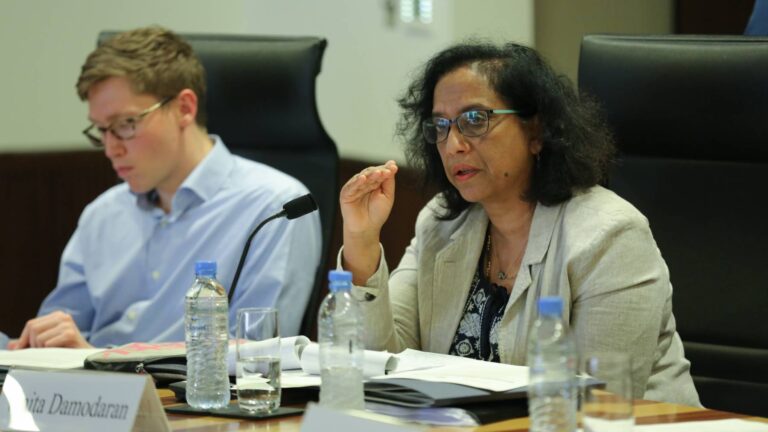Dialogue Series, Environmental Studies
Climate Vulnerability in South Asia's Coastal Cities

On January 10-11, 2017, urbanists, governance experts, and climate change specialists gathered in Doha for a two-day workshop co-hosted by the Strauss Center for International Security and Law at the University of Texas at Austin and the Center for International and Regional Studies at Georgetown University in Qatar to consider climate change vulnerability and governance in coastal cities of South Asia.
Topics debated in the workshop include the nature and definition of various understandings of climate vulnerability, the role that coastal geographies and ecologies play in exacerbating climate vulnerability, the impacts of climate change on urban settlement and migration, and the governance challenges faced by cities as they attempt (or in some cases do not attempt) to address their climate change vulnerabilities. The conversation was specifically designed to generate comparative discussion across coastal cities in the region with particular attention paid to coastal mega-cities of the region including Chennai, Dhaka, Karachi, Kolkata, and Mumbai.
Key policy-relevant questions considered by the workshop participants include:
- How should we understand climate-related vulnerability in South Asia’s changing urban context?
- How should we think about governance vulnerabilities as we contemplate climate hazards?
- In which ways will climate change transform the ways that coastal cities encounter their physical and governance environments?
- How will the anticipated phenomenon of mass displacement and migration challenge our accepted understandings of sovereignty and the protection missions of the state, the city, and the community?
- How does and should our understanding of the science of climate change affect the ways policy is developed across borders and governance systems?
The workshop was the latest in an ongoing series of conversations on this topic organized by Dr. Paula Newberg as part of the Strauss Center’s research initiative on Complex Emergencies and Political Stability in Asia (CEPSA). The research program explores the diverse forces that contribute to climate-related disaster vulnerability and complex emergencies in Asia, the implications of such events for local and regional security, and how investments in preparedness can minimize these impacts and build resilience. CEPSA is a multi-year initiative funded by the U.S. Department of Defense’s Minerva Initiative, a university based, social science research program focused on areas of strategic importance to national security policy.
Please click here to view Agenda
Participants and Discussants:
- Kamran Asdar Ali, University of Texas
- Nausheen Anwar, Institute of Business Administration, Karachi
- Zahra Babar, CIRS – Georgetown University in Qatar
- Misba Bhatti, CIRS – Georgetown University in Qatar
- Sheryl Beach, University of Texas
- Timothy Beach, University of Texas
- Solomon Benjamin, Indian Institute of Technology Madras
- Jason Cons, University of Texas
- Vinita Damodaran, University of Sussex
- Rupali Gupte, Collective Research Initiatives Trust, Mumbai
- Arif Hasan, Architect, Planner, and Social Researcher, Karachi
- Islam Hassan, CIRS – Georgetown University in Qatar
- Iftekhar Iqbal, Universiti Brunei Darussalam, Bangladesh
- Garima Jain, India Institute for Human Settlements, Bengaluru
- Mehran Kamrava, CIRS – Georgetown University in Qatar
- M. Hafijul Islam Khan, International Centre for Climate Change and Development, Bangladesh
- Mathangi Krishnamoorthy, Indian Institute of Technology Madras
- Anatol Lieven, Georgetown University in Qatar
- Sohail Malik, Innovative Development Strategies, Islamabad
- Paula Newberg, University of Texas
- Mahesh Rajasekar, Taru Leading Edge and Taru Research Information Network, India
- Asad Sayeed, Collective for Social Science Research, Karachi
- Ali T. Sheikh, Leadership for Environment and Development (LEAD), Pakistan
- Sam Tabory, Chicago Council on Global Affairs
- Clare Wait, Georgetown University in Qatar
- Adeel Zafar, Simon Fraser University, British Columbia